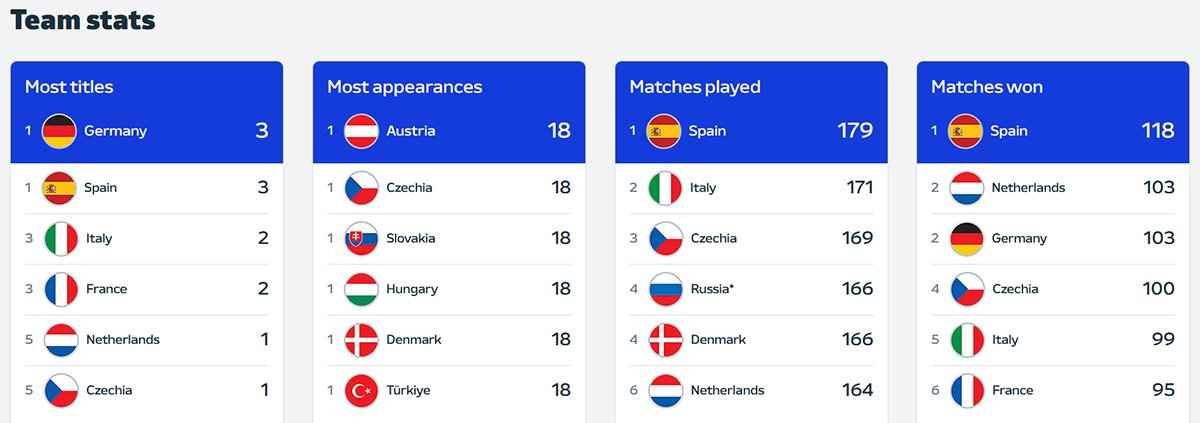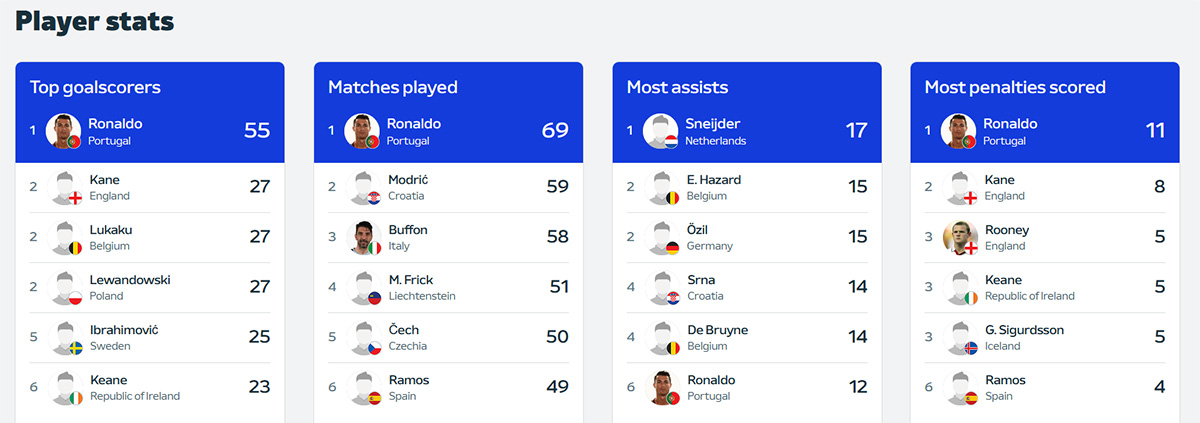UEFA Euro History
UEFA history began with the foundation of the Union of European Football Associations (UEFA), dedicated to shaping European football. Iconic stadiums witness record-breaking performances and historic victories. Teams strategize in qualifying rounds for prestigious trophies. With the rise of football analytics and match predictions, fans engage in sports betting. UEFA's legacy as a guardian of the beautiful game endures, promoting unity and passion across the continent.
The Foundation of UEFA
UEFA, the Union of European Football Associations, was established on June 15, 1954, in Basel, Switzerland. Its inception marked a pivotal moment in European football history, uniting football associations across the continent under one umbrella organization. The primary vision behind UEFA's formation was to promote and develop football at both the national and continental levels.
At the time of its founding, European football was fragmented, with individual countries organizing their own competitions and lacking a cohesive structure for international tournaments. UEFA aimed to address these issues by fostering cooperation among member associations, standardizing rules and regulations, and organizing prestigious continental competitions.
One of the driving forces behind UEFA's creation was the desire to establish a European club competition that would showcase the best teams from across the continent. This vision eventually led to the creation of the European Cup, the precursor to the modern-day UEFA Champions League.
The Evolution of the European Cup to Champions League
The transformation from the European Cup to the Champions League marked a significant shift in European club football.
The Early Years of European Competitions
 From its inception as the
European Cup in 1955, the continental football landscape underwent a transformative journey leading to the
establishment of the UEFA Champions League in 1992. The transition was driven by several factors, including
the need to modernize and expand the tournament to accommodate the growing number of elite clubs across
Europe.
From its inception as the
European Cup in 1955, the continental football landscape underwent a transformative journey leading to the
establishment of the UEFA Champions League in 1992. The transition was driven by several factors, including
the need to modernize and expand the tournament to accommodate the growing number of elite clubs across
Europe.
As football evolved and commercial interests grew, UEFA recognized the potential to enhance the tournament's appeal by rebranding it as the Champions League. The introduction of a group stage format alongside the traditional knockout phase allowed for more matches, increased revenue, and greater viewer engagement. This shift not only elevated the prestige of the competition but also paved the way for unprecedented growth and global recognition.
Memorable Finals
| Year | Final | Winner | Notable Moment |
|---|---|---|---|
| 1967 | Celtic vs. Inter Milan | Celtic | Celtic became the first British club to win the European Cup, defeating the Italian giants Inter Milan in Lisbon. |
| 1999 | Manchester United vs. Bayern Munich | Manchester United | Manchester United scored two goals in injury time to snatch victory from the jaws of defeat, completing an unforgettable comeback. |
| 2005 | Liverpool vs. AC Milan | Liverpool | Liverpool staged a remarkable comeback from 3-0 down at halftime to eventually win on penalties, dubbed the "Miracle of Istanbul." |
| 2012 | Chelsea vs. Bayern Munich | Chelsea | Chelsea won their first Champions League title in dramatic fashion, triumphing over Bayern Munich in a penalty shootout at the Allianz Arena. |
UEFA Euro: A Continental Fiesta
Highlighted by record-breaking matches and unforgettable tournaments, the UEFA Euro showcases the talents of remarkable goal scorers who leave their mark on the continental stage, captivating fans with their skill and flair.
Unforgettable Euro Tournaments
The UEFA European Championship has provided football fans with countless memorable moments over the years. Some tournaments stand out not only for the quality of football on display but also for the unexpected winners and thrilling matches that have left an indelible mark on the sport's history.
- 1968: Italy - The First Euros: The inaugural UEFA European Championship in 1968, held in Italy, set the stage for future tournaments. With just four teams competing, the tournament culminated in a thrilling final between Italy and Yugoslavia. After a goalless draw in regular time, Italy emerged victorious in the replay, securing their first major international title.
- 1992: Denmark - The Miracle of '92: The 1992 Euros in Sweden produced one of the greatest underdog stories in football history. Due to political unrest in Yugoslavia, Denmark was invited to replace them at the last minute. Despite being considered outsiders, Denmark defied the odds to lift the trophy, defeating Germany 2-0 in the final.
- 2004: Greece - The Ultimate Underdogs: In perhaps the most surprising triumph in Euros history, Greece stunned the footballing world by winning the tournament in 2004. Coached by Otto Rehhagel, Greece employed a disciplined defensive strategy to overcome formidable opponents, culminating in a shock victory over Portugal in the final.
- 2008: Spain - Tiki-Taka Triumphs: The 2008 Euros in Austria and Switzerland marked the beginning of Spain's era of dominance in international football. Led by coach Luis Aragonés and featuring a generation of supremely talented players, Spain showcased their trademark tiki-taka style en route to lifting the trophy, defeating Germany 1-0 in the final.
- 2016: Portugal - Ronaldo's Redemption: The 2016 Euros in France provided a fairytale ending for Portugal and their talismanic captain, Cristiano Ronaldo. Despite Ronaldo's early injury in the final against France, Portugal persevered and secured victory through an extra-time goal from Eder, clinching their first major international title.
These iconic Euro championships not only celebrated the best of European football but also showcased the unpredictable nature of the sport, with unexpected winners and thrilling matches that will be remembered for generations to come.
Record-Breaking Matches and Players
 Legendary players in UEFA Euro History:
Legendary players in UEFA Euro History:
| Player | Goals | Championships |
|---|---|---|
| Cristiano Ronaldo | 14 | 2004, 2008, 2012, 2016, 2020 |
| Michel Platini | 9 | 1984 |
| Alan Shearer | 7 | 1996 |
| Antoine Griezmann | 7 | 2016 |
| Thierry Henry | 6 | 2000, 2004 |
Most Appearances in UEFA Euro History:
| Player | Appearances | Football Championships |
|---|---|---|
| Gianluigi Buffon | 17 | 2004, 2008, 2012, 2016 |
| Cristiano Ronaldo | 21 | 2004, 2008, 2012, 2016, 2020 |
| Bastian Schweinsteiger | 18 | 2004, 2008, 2012, 2016 |
| Lilian Thuram | 16 | 1996, 2000, 2004, 2008 |
| Sergio Ramos | 16 | 2008, 2012, 2016, 2020 |
Surprising Upsets in UEFA Euro History:
- Denmark's Triumph in 1992: Denmark, initially not even qualified, won the tournament after Yugoslavia's disqualification due to political unrest. They went on to defeat reigning champions Netherlands in the semifinals and Germany in the final.
- Greece's Victory in 2004: Greece's triumph in 2004 stunned the footballing world. Despite being considered underdogs, they employed a defensive style to defeat Portugal in the final, achieving their first major international title.
- Czech Republic's Run in 1996: The Czech Republic reached the final in 1996, defeating highly-favored teams such as Italy and France along the way. Their run showcased their resilience and tactical prowess.
- Iceland's Debut in 2016: Making their debut in a major tournament, Iceland captivated fans with their spirited performances, including a stunning 2-1 victory over England in the Round of 16, showcasing the rise of smaller footballing national teams.
The Future of UEFA Competitions
As football continues to evolve, UEFA competitions are poised for significant changes. Here's what we can expect:
- Format Changes: Anticipate modifications to Champions League and Europa League formats for greater competitiveness and revenue. This could involve expanding team numbers or revising qualification criteria to intensify the drama in final matches.
- Technology Integration: Continued integration of technology like VAR and goal-line systems will elevate match officiating and viewer experience. Expect further advancements in player tracking and broadcast technologies to highlight match highlights and create immersive experiences for fans.
- Global Football Landscape: UEFA competitions will adapt to the global football market by exploring expansion into new regions and fostering partnerships with international leagues, setting the stage for historic victories in iconic stadiums across the globe.
- Sustainability and Social Responsibility: UEFA competitions will prioritize sustainability initiatives and community engagement programs to address environmental concerns and promote social responsibility, ensuring that award ceremonies celebrate both on-field success and off-field contributions.
- Fan Engagement and Experience: Efforts will be made to enhance fan engagement through technology-driven initiatives like virtual reality experiences and interactive mobile apps, offering fans a front-row seat to thrilling penalty shootouts and the exploits of their favorite football legends and title defenders.
FAQ
"Which club has won the most UEFA Champions League titles?"
Real Madrid holds the record for the most UEFA Champions League titles. Their success reflects their mastery of competition rules and strategic prowess on the European stage.
"What was the biggest upset in UEFA Euro history?"
One of the most remarkable surprise upsets in UEFA Euro history occurred when Greece clinched victory in the 2004 final against Portugal, securing their historic triumph.
"How many teams compete in the UEFA Europa League?"
As of EURO 2024, the UEFA Europa League features a dynamic mix of teams from across Europe, showcasing diverse team strategies and offering fans an electrifying matchday experience. A total of 78 teams from between 33 and 48 of the 55 UEFA member associations are expected to participate in the 2023–24 UEFA Europa League.
"Who scored the fastest goal in UEFA Champions League history?"
The fastest goal in UEFA Champions League history was netted by Roy Makaay, astonishingly finding the back of the net just 10.12 seconds into a match for Bayern Munich against Real Madrid in March 2007.
"What changes are expected in the UEFA competitions format?"
Anticipated changes in UEFA competitions format may include adjustments to increase competitiveness and revenue, potentially altering competition rules and the structure of international fixtures. These changes reflect ongoing efforts in football governance to ensure fairness, sustainability, and innovation in UEFA tournaments, while also responding to the evolving needs and preferences of fans and stakeholders.
"How has UEFA Champions League impacted African footballers?"
The UEFA Champions League has significantly elevated the profiles of African football legends, providing them with platforms to showcase their talents on esteemed stages and secure historic victories for their respective clubs. Through international fixtures against Europe's top teams, African players have gained invaluable experience and exposure, enhancing their reputations and opening doors to opportunities both within and outside the continent.
"Which African player has the most appearances in UEFA competitions?"
Samuel Eto'o from Cameroon stands tall as the African football legend with the most appearances in UEFA competitions.
